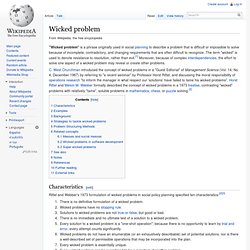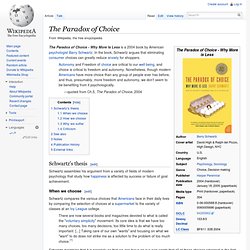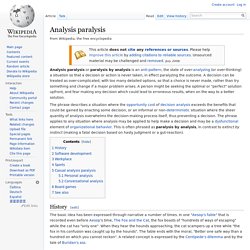

Wicked problem. "Wicked problem" is a phrase originally used in social planning to describe a problem that is difficult or impossible to solve because of incomplete, contradictory, and changing requirements that are often difficult to recognize.

The term "wicked" is used to denote resistance to resolution, rather than evil.[1] Moreover, because of complex interdependencies, the effort to solve one aspect of a wicked problem may reveal or create other problems. C. West Churchman introduced the concept of wicked problems in a "Guest Editorial" of Management Science (Vol. 14, No. 4, December 1967) by referring to "a recent seminar" by Professor Horst Rittel, and discussing the moral responsibility of operations research "to inform the manager in what respect our 'solutions' have failed to tame his wicked problems". Horst Rittel and Melvin M. Characteristics[edit] Rittel and Webber's 1973 formulation of wicked problems in social policy planning specified ten characteristics:[2][3] Examples[edit] Authoritative. Daniel Kahneman. The Paradox of Choice: Why More Is Less.
Autonomy and Freedom of choice are critical to our well being, and choice is critical to freedom and autonomy.

Nonetheless, though modern Americans have more choice than any group of people ever has before, and thus, presumably, more freedom and autonomy, we don't seem to be benefiting from it psychologically. —quoted from Ch.5, The Paradox of Choice, 2004 Schwartz's thesis[edit] Schwartz assembles his argument from a variety of fields of modern psychology that study how happiness is affected by success or failure of goal achievement. When we choose[edit] Schwartz compares the various choices that Americans face in their daily lives by comparing the selection of choices at a supermarket to the variety of classes at an Ivy League college.
There are now several books and magazines devoted to what is called the "voluntary simplicity" movement. Schwartz maintains that it is precisely so that we can focus on our own wants that all of these choices emerged in the first place. How we choose[edit] Analysis paralysis. Analysis paralysis or paralysis by analysis is an anti-pattern, the state of over-analyzing (or over-thinking) a situation so that a decision or action is never taken, in effect paralyzing the outcome.

A decision can be treated as over-complicated, with too many detailed options, so that a choice is never made, rather than try something and change if a major problem arises. A person might be seeking the optimal or "perfect" solution upfront, and fear making any decision which could lead to erroneous results, when on the way to a better solution. The phrase describes a situation where the opportunity cost of decision analysis exceeds the benefits that could be gained by enacting some decision, or an informal or non-deterministic situation where the sheer quantity of analysis overwhelms the decision-making process itself, thus preventing a decision. History[edit] Software development[edit] Analysis paralysis is an example of an anti-pattern. Workplace[edit] Sports[edit] Board games[edit]